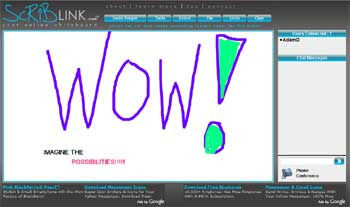
I played around with a site called Scriblink. While the idea of an interactive virtual whiteboard that welcomes collaboration is enticing and exciting, this software falls short somewhat. Its shortcomings are not its features, but its interface. It uses mouseovers that can easily jump to a function that you weren't looking for, the text editing is just that - text without any formatting save for color, lines and shapes that are basic, and a way to import images but you can't really do anything with them once they are on the board. Where it shines is the "free" tool. That's how I made the "WOW" text. I could see using JUST that tool while working with others. The shortcoming there is that you must be skilled with a mouse (or even better - the touchpad!). I used the latter with some practice.
Despite the fact that this is not the greatest web-based application out there, it raises several key questions. First, is a truly interactive collaborative digital space that far away? Second, what implications (or possibilities) does this hold for the classroom of tomorrow? I like to think that walls that keep us physically inside our classroom do not exist digitally, so there ya go. Meeting rooms might not be needed, or at least not at the size and importance that they once had. There is a ton of space out there on the Internet... pull up a kiosk sometime.
Therefore, while Scriblink might not be the digital tool to expand our technological horizons, it might be the grandfather (grandmother?) to the application that is. I wonder if the inventor of Pong ever envisioned the video games of today...
 Well, the new semester of T.E.A.M. has officially begun, and I had the pleasure of meeting Dr. Mark Weston, our new mentor. He challenged us with this notion of educational revolution, and asked if we believed it to be inevitable. Of course, I said yes. My philosophy is that our classrooms are true extensions of the world around us, therefore if the world is constantly changing so shall our classrooms. New social situations, economical environments, life skills, technologies, instructional models, facilities and our ever changing population make education an inheritantly dynamic setting.
Well, the new semester of T.E.A.M. has officially begun, and I had the pleasure of meeting Dr. Mark Weston, our new mentor. He challenged us with this notion of educational revolution, and asked if we believed it to be inevitable. Of course, I said yes. My philosophy is that our classrooms are true extensions of the world around us, therefore if the world is constantly changing so shall our classrooms. New social situations, economical environments, life skills, technologies, instructional models, facilities and our ever changing population make education an inheritantly dynamic setting.


